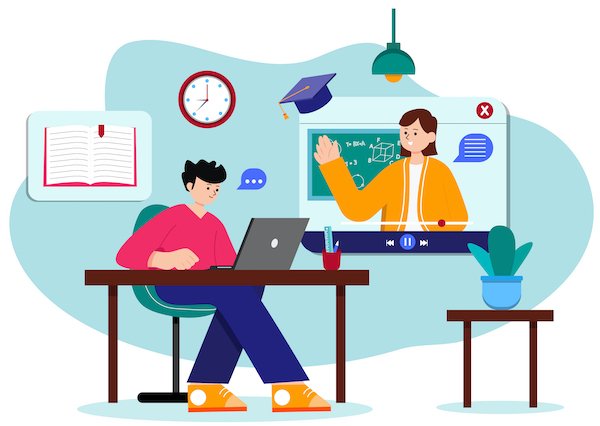Currently Empty: £0.00

What is tutoring?
By Sean Sanborn
Tutoring is not just helping a student with homework. Tutoring is mentoring a student in a process to reach a solution to problems. An academic tutor will offer tutelage in a specific subject area or skill set. A competent tutor will not tell the student what to think but guide them in how to think for themselves. If done correctly, the student will be empowered to use problem-solving skills without help.
How to choose an online tutor
1. Is the tutor experienced/certified?
2. How much does the tutoring cost?
3. Do you want online tutoring or in-person lessons?
4. Is the tutor available at convenient hours?
5. What tools /technology does the tutor employ?
6. Does the tutor’s style match your needs?
we will conclude with how and why tutoring can be beneficial.

1. Is the tutor experienced/certified?
Just because a teacher is certified, it doesn’t mean they have any clue how to teach. On the other hand, a talented tutor is capable of tutoring a subject where they are not an expert.
Tutoring is not teaching. Tutoring is encouraging a student to understand the assignment a teacher has given. A tutor will prod a student to solve complicated problems and achieve the work they have been assigned. A bad tutor will think of themselves as a teacher and try to give information to the student. A teacher communicates important information. A tutor coaches a student to achieve their goals.
That said, it is important for a tutor to understand the subject they are tutoring. If the tutor has certification in the subject they are tutoring then that is a secondary consideration to whether the tutor is skilled and experienced in the art of tutoring.
Sometimes a tutor with less certifications might have a special ability to connect with their student. Usually someone who has more experience will tutor more skillfully than someone with more certifications.
Story
Even though my university professor had lived in the USA for many years, his accent remained painfully thick. He was incredibly intelligent and understood “Finite Autonoma” better than anyone. Unfortunately, he could not effectively communicate this knowledge. There was no one who could tutor our class, so our class met regularly to interpret our professor. I am sure I could have increased my B to an A had I found a capable tutor!

2. How much does the tutoring cost?
How much do you value your future success? This is not said as a joke. Oftentimes, you really do get what you pay for. If you can learn to excel at highly technical and transferable skills then you might be sitting on a jackpot. Or you might not. Technology changes so rapidly that you are going to have to race to overtake your competitors. A proficient tutor will assist their student(s) to attain higher scores at faster speeds than they could have achieved on their own. The better the tutor, the better the results the student will accomplish.

3. Online or in Person
It can be comforting to meet with a tutor in person, but most of the time that option is prohibited by expense and time. If your internet connection is adequate, then typically your easiest option will be online, saving you a long drive, or your tutor a long drive.

4. Is the tutor available at convenient hours?
This is especially important for students who do not live in the same time-zone as their tutor.
Keep in mind, the more experienced a tutor, the harder it will be to find them available during the hours you need. You may have to choose between the most qualified tutor at an awkward hour, and a good tutor at a convenient hour.

5. What tools /technology does the tutor employ?
Services like Zoom, join.me, and goto.com have become popular ever since covid-19 reared its ugly head. Most online tutors will use this or some similar tool that allows for:
- Face to face interaction
- Messaging
- Screen sharing/ annotation/ whiteboards
- File sharing
- Bonus. Screen recording to rewatch the lesson later.

6. Does the tutor’s style match our needs?
Please continue reading below about The Seven Learning Styles to discover your learning style or the learning style of your child.
An advantage of online transparency is that you can often get an idea of the persona of your tutor before you even select them. You will want to look at their profile and examine their background and experience.
Another great tool, is to search through reviews to learn what others have said about their experience.
Why should I hire a tutor?
Style, Stress, Pace, Roll. These are the issues to consider before you begin. A skillful tutor will help to fill in any areas where there is a gap and prepare students with tools of success.
How will private tutoring help?
1. Style
One size does not fit all students. It never could.
Every person on earth is unique and has their own learning challenges and strengths. Numerous studies show that homeschooled and privately tutored students fare better than students who are crammed into a big class with a single teacher. Rarely do teachers have the tools to be able to meet the learning needs of all of their assorted student types. The more students attend the class, the less able they are to meet their needs.
There are numerous learning styles amongst students and one popular model is to classify students into seven learning groupings. Unless classroom teachers tailor their approach to the learning style of every single student in their care -> some students will be left behind and believe lies about their abilities.
To learn more about this go to https://blog.cognifit.com/learning-styles/
The Seven Learning Styles
- Visual (Spatial): Students prefer pictures, puzzles, videos, charts, interpreting, etc…
- Aural (Auditory): Students prefer audio books, instruments, music, tones, rhythm, mnemonics, etc…
- Verbal (Linguistic): Students prefer dramatization, writing, speaking, listening, persuasion, languages, teaching, etc…
- Physical (Kinesthetic): Students prefer working with their hands, sports, dancing, acting, physical coordination
- Logical (Mathematical): Students prefer systems, patterns, procedures, logic, numbers, categorization, problem solving, geometry, math equations, deductive logic and big picture concepts.
- Social (Interpersonal): Students prefer communication, conflict resolution, role-playing, and listening. They are hyper aware of motivations and feelings of others. They can perceive multiple viewpoints.
- Solitary (Intrapersonal): Students prefer self-reflection, introspection, self-analysis. They study best in quiet places.
Humans are not all cookie-cutter androids which provides beautiful diversity among us. This is why school “systems” let children down. A tutor will determine a student’s learning style and cater to what the student needs.
Story: I nearly dropped out of school.
In third grade I struggled with writing until a teacher took personal time to tutor me and help me work through dislek, deslax,… dyslexia.
My seventh grade homeroom teacher was a venomous, petty man. He directed intense condemning negativity at me. In math class a different teacher taught in such a way that only some students in my class understood what was going on. Most of us in class had no clue what was being taught.
This created a snowball effect for me. My confidence lowered. Back in sixth grade I thought I was good at math, but by the end of seventh grade, I was considering dropping out of school altogether. I believed that my inability to understand was my failure to learn and not the failure of my teachers to teach. This is ludicrous now with hindsight of my accomplishments which include writing a fiction trilogy.
2. Stressed-out?
Am I stressed out? Is my child stressed out?
Stress is typically the result of not feeling equipped to cope with specific demands and events. If a student has the opportunity to try out a task and get immediate feedback, then through regular practice, they will begin to feel confident in their new abilities.
Is math scarier than a snake? Yes according to study of third graders in the Journal of Neuroscience where they tapped into “the fear circuitry in the brain” of math students using a MRI scan.
The researchers discovered that the cure to releasing the phobia was to repeatedly expose them to the thing they feared in a safe environment.
By the end of two months, the tutored kids who were anxious about math were 20% less anxious. One-on-one tutoring calmed the fear circuitry in the brain.
Repeatedly exposing students to different variations of the same problems will lead students to increase their confidence, their classroom engagement and even their test scores.
Therefore, repetition is the solution to this kind of stress.
To learn more about this check out:
3. Pace. Slow down! Speed up!
You never fail until you stop trying. ”― Albert Einstein
Do you want to make a genius fail?
Some teachers move at the speed of the slowest student in the room. For capable students this is agonizingly boring. These brilliant students will stop paying attention since they already know much of the information coming from the teacher. This can lead to negative behavior.
Do you want to fill a methodical student with anxiety?
Some teachers teach at the speed of the student in the room who best understands that particular topic. Meanwhile the rest of the room is left baffled about what is going on. Some students shut down and go to sleep while others act out with practical jokes. The results are rarely positive.
“Failure is success in progress”― Albert Einstein
Turtle or rabbit, each student is trying to reach the finish line. Some may take more time, but that does not mean that they are less intelligent. Some students do great on tests but instantly eject the information from their brain the moment the test ends.
Backtracking to help students keep up
Often struggling students have a gap in their understanding that prevents them from keeping pace with their peers. A tutor’s job is to discern what key concepts they do not yet understand and assist them with skill reinforcement.
Preemptive
Many students find that by getting ahead of the syllabus then they are better able to handle difficult concepts. This will give a student a clear advantage when taking an exam. In fact, exam taking skills are as essential to knowing the information contained in the test.
One-to-one tutoring gives students the chance to learn in their own way and pace. Students need the freedom to make mistakes, experiment, and try out unexpected ideas in a supportive, non-judgmental atmosphere. It is nearly impossible for a teacher to meet the needs of all of their students. Whether lectures are too fast or too slow, all students can benefit from learning at their own optimum pace.
4. Role
Parents and Teachers are not able to meet every need.
Parents are the ultimate tutor for every life skill their child might need. Yet, no matter how brilliant a parent may be, most parents are not equipped to teach every single subject. And, neither can an entire school filled with full-time teachers. Students need varied input from numerous types of mentors. A talented tutor can restore breaches left unfilled by the other teachers in a student’s life. A tutor’s ability to pinpoint specific weaknesses and tailor individual tutoring sessions will impart trust.
Question: Does your child discredit your words merely because you are their parent? Consider this example conversation between a parent and a child.
Example
“Mom, I’m bad at math.”
“No sweetie, you are just struggling with fractions. You have always been great at math.”
“Mom, you only see me in a positive light. Why can’t you just admit that I stink at math.”
“What did your tutor say?”
“Well, okay, he said I’m doing fine.”
“So?”
“Alright. I’ll go do my homework.”
Students need an outside voice to encourage and boost their confidence. If they internalize negativity then they will believe that they are incapable of learning.
This is especially evident regarding admissions tests like SAT/ACT and various academic program placement tests. Unlike weekly informational quizzes, placement tests are structured to compute a student’s overall comprehension and ability to solve complex problems.
One of the most effective tutoring strategies is to teach strategies and techniques in the art of test-taking. Practice tests dramatically lower students anxiety and leads to higher test scores. This is why practice tests can be more impactful use of time than mere “cramming the facts.”
Learning practicable strategies will not only help improve students’ grades, but improve their confidence on exams and help understand how to work through unfamiliar material.
Story
I took French for two years without a tutor and I barely remember anything I learned during that time. Later in life, I was privately tutored in the Thai language for four years and I achieved my sixth grade reading/writing certificate. Without tutoring I would have been unable to speak publicly. In my case, tutoring made all the difference.
How will a tutor help me or my child?
Top University Researchers Claim that Tutoring will make a huge difference in your child’s education.

Empowerment
A competent tutor will empower a student to help themselves in the following areas
- Independent Problem Solving
- Increased Condidence
- Empowered to Ask Questions
- Learn How to Learn
One-on-one customized instruction will gradually help a student move from frustrated, confused and low-esteem to re-discover their self-esteem and confidence. With practice they will rediscover their love of learning. This will destine them to future scholastic and life success.
My college Calculus tutoring story
Calculus at my university was only ever offered at 7am. Each night I would stay up late in the computer lab compiling code. Meanwhile, I tutored my fellow math students in the afternoons. My tutoring increased my classmates grades from C’s to A’s. At 7am I would tiredly stagger late into Calculus. Many classes began with unannounced pop quizzes which accounted for 20% of our grade, lowering my grade from an A to a pathetic C. The irony was painful.

How to prepare your child for tutoring before you begin!
If you are arranging tutoring for your child. Make sure they have “buy-in.” If you do too much upfront work and the child is unhappy with the result then you might be wasting your time. Your child needs to connect with the tutor and commit to the plan to do tutoring, otherwise the students lack of involvement might doom this plan to failure. Motivating our children is one of the most difficult tasks parents encounter.
Collaborate
Get teachers and family members involved. Ask teachers to give assignments in advance that can go to the tutor so they can prepare themselves. Ask family members to not tease the student who is tutored – as if there was a deficiency, but instead become lifelines of support and encouragement.

Conclusion
Regardless of whether a student is struggling because of style, stress, or pacing, there can be victory. Once a student loses their confidence that they are capable learners, they will begin to fail in numerous other ways. If a student is boosted to the front of the pack, they will begin to feel as if they belong there. The ramifications of early education decisions could affect many of their future life goals.








